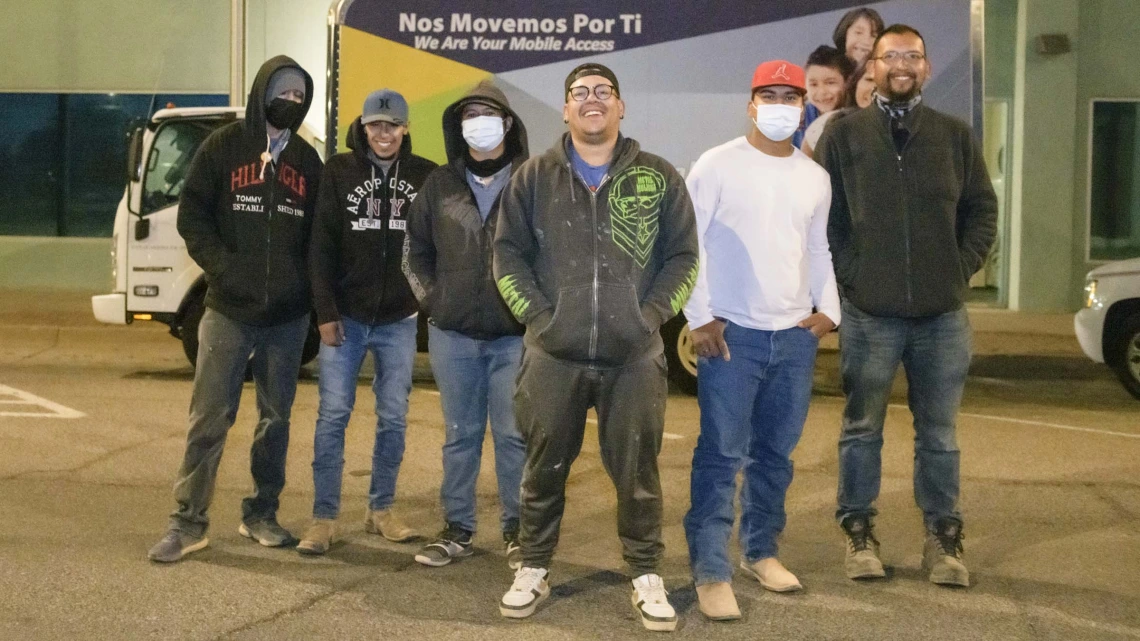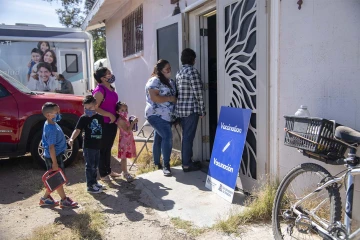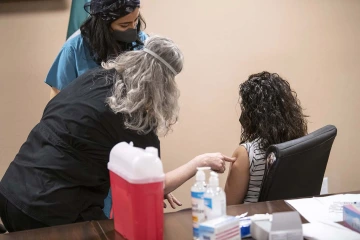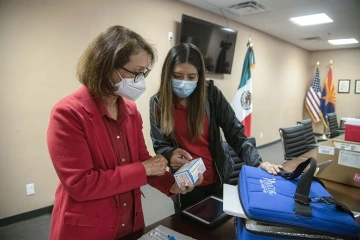COVID-19 Vaccine Mobile Outreach Expands in Rural Arizona
A new mobile health unit initiative is getting more vaccines in the arms of rural, Hispanic and other hard-to-reach populations in southern Arizona.

From left: Oscar Moreno, Mara Rodriguez, Jairo Lopez, Ruben Sosa, Nestor Quiñonez and Jesús Pérez – all farmworkers from Agua Prieta, Mexico – gathered at the Consulate of Mexico in Douglas, Arizona, for a COVID-19 vaccine clinic hosted by UArizona Health Sciences and the Cochise County Health Department.
Since February, a University of Arizona Health Sciences coordinated effort to get the COVID-19 vaccine to hard-to-reach communities in Arizona has administered about 10,000 shots as part of the Mobile Outreach Vaccination and Education for Underserved Populations (MOVE UP) program.

People line up outside the Aguila, Arizona, community center to get COVID-19 vaccine shots for a MOVE-UP clinic hosted by the UArizona Health Sciences,. The mobile health unit van of the UArizona Zuckerman College of Public Health is visible in background.
Most counties are already vaccinating people via drive-up and other fixed-site COVID-19 vaccine points of distribution (PODs) in urban areas. Ongoing outreach through more targeted community efforts like MOVE UP will be increasingly important for getting more people vaccinated, said Cecilia Rosales, MD, MS, who heads the MOVE UP initiative and is associate dean of Phoenix programs as well as community outreach and engagement at the UArizona Mel and Enid Zuckerman College of Public Health.
“MOVE UP’s overarching goal is to reach people in communities who won’t go to the big vaccine PODs because they have transportation issues, they have language issues, they have technology issues,” Dr. Rosales said, adding that the program started in Maricopa County and has expanded from there. “Most people when they think of Maricopa County, they think of Phoenix and this dense urban area – but it has rural areas there, too. These are small farming communities where we’ve hosted a number of mobile vaccine clinics.”
The first MOVE UP event outside of Maricopa County was held April 23 at the Consulate of Mexico in Douglas. The event, held in partnership with the Cochise County Health Department, began vaccinating agricultural laborers crossing the border to work at 3 a.m., and opened to the general public at 7 a.m. About 75 vaccines were administered.
About 200 people were vaccinated at a second MOVE UP vaccine clinic April 28 at the Consulate of Mexico in Nogales, Arizona, held in partnership with the Santa Cruz County Health Department. It focused on vaccinating truck drivers who transport produce across the border. Future clinics are being planned in Palominas – a town off Arizona Highway 92 in Cochise County with a population of just over 200 – as well as others in conjunction with the Graham County Health Department.

College of Medicine – Tucson student Maya Sarihan (standing) gets instructions from College of Nursing preceptor Heather Carlisle, PhD, DNP, RN, on administering a COVID-19 vaccine for client Ruby Chávez Olivares (seated).
The clinics are staffed by faculty and student volunteers from the College of Medicine – Tucson, College of Medicine – Phoenix, College of Nursing and College of Pharmacy, as well as staff and volunteers from the College of Public Health.
Daniel Derksen, MD, UArizona Health Sciences associate vice president for health equity, outreach and interprofessional activities, and director of the UArizona Center for Rural Health, said that in addition to serving needs of rural and diverse communities, the MOVE UP clinics also meet the educational and training missions of the five Health Sciences colleges.
“We’ve been incorporating elements of our Area Health Education Center program to give all our health profession students opportunities to participate in this as an applied public health effort,” Dr. Derksen said. “Public health, pharmacy, nursing and medical students from Tucson and Phoenix – these mobile vaccine clinics use them all.”
Upcoming MOVE UP vaccine sites include senior housing complexes in Phoenix, Peoria and Gilbert, schools in Gila Bend, Maryvale and Glendale, and farms in Aguila and Arlington. It’s anticipated MOVE UP soon will be running at least three to four mobile vaccine clinics a week, including at community centers, schools, senior housing and long-term care facilities.
“For these farm events, we’ll reach out to other farms in the area and ask if they’d like to bring their folks to get vaccinated, too,” said Jeff Hanna, MPH, clinical research coordinator for the Zuckerman College of Public Health and manager for the Primary Prevention Mobile Health Unit based in Phoenix. “The farms bring workers in from the fields in buses. The people come through 60 to 80 at a time. We have like 14 to 15 vaccinators, so lines move really fast. We’ve done them at produce farms, dairy farms and chicken farms.”

Cecilia Rosales, MD, MS, and Sheila Soto, director and manager of the Tucson mobile health unit at the UArizona Mel and Enid Zuckerman College of Public Health, review packaging for the COVID-19 vaccines to be administered in Douglas, Arizona. Initially for farmworkers crossing over from Mexico starting at 3 a.m., the clinic was open to the public from 7 to 11 a.m.
Sheila Soto, MPH, manager for the Primary Prevention Mobile Health Unit based in Tucson, added that these clinics aren’t just for administering vaccines. They also include the mobile health unit’s standard health screenings for blood pressure, cholesterol, diabetes and body mass index, along with referrals for cardiovascular, respiratory and other medical conditions.
“I’m really excited about MOVE UP,” Soto said. “This is the community we’ve been serving the last several years. We’re people they know and trust. We got calls, especially when vaccines were first rolled out, from people checking to see where the vaccinations were and should they get them. I think that will make a difference, especially in rural areas.”
Staff from the UArizona College of Medicine – Tucson’s Department of Family and Community Medicine, which has its own Mobile Health Unit Program for primary care, have been training with Dr. Rosales’ team and are assisting with MOVE UP efforts. Ron Sorenson, the department’s mobile health program director, is coordinating UArizona Health Sciences volunteers for the vaccine clinics in southern Arizona, and College of Public Health mobile health staff and volunteers manage registration, check-in, screening, observation and follow-up scheduling.
“This is the first time our mobile health program has done something like this, so it’s been helpful to work together. I think it’ll be a beneficial partnership. And we’ll meet a need for our rural communities to get the vaccine out there,” Sorenson said.
Photo Gallery: Southern Arizona COVID-19 Vaccination Clinics Go Mobile

